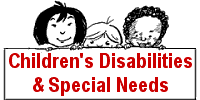 |

| |
|
| ||
Guidelines for Your Child's First WordsThe first words that children use describe their own experiences and their motivations. Ordinarily they do not first talk about adult or school ideas. They have their own first language and appear to develop language best if they are helped to develop that special language before they learn adult or school words. Children learn words and use them in communication best when those words do the following things. Describe what the child is doing and thinking. The people and actions that directly engage the child and the objects and events he genuinely cares about are most likely to be reflected in first words. These words, which represent the child's own opinions and thoughts, are more likely to become a part of his natural vocabulary than are abstract concepts like numbers, letters, colors or other experiences that are primarily important to adults. Describe things he knows. Think of words as things that tell us what the child knows. He is more likely to begin talking, especially on his own, about things he already knows than the things adults often test him for with their questions. We are more likely to help a child learn words if they are for things he clearly knows than if they are for things we may hope he will learn. Express the child's own intentions. This may first be seen in his sounds, gestures, or other primitive communications. If you ask "What is he trying to tell me with his movements and sound?", the answers may give you a good idea of some of the next words he is ready to learn. Words for things or events he can control or manipulate. Through such control the child is more likely to learn the meaningful aspects of his experiences and be motivated to talk about them. Words that have frequent communicative uses. A child is more inclined to learn words if he has frequent and easy opportunities to communicate them. The more reasons he has to communicate and the more people accepting those communications, the more likely will he use those words habitually. For example, words like "me," "give," "you", "where" and "funny" have countless opportunities for natural communicative use. Words for numbers, letters, colors, and adult ideas have relatively little communicative use for a child learning to speak. Ask yourself this question about words you want your child to learn: "How often will my child have chances to communicate them?" Remember, the more your child communicates, the more he will naturally learn many words. James D. MacDonald has been a Clinician and researcher with children with language disorders since 1968. He was Professor of Speech/Language Pathology and Director of the Parent-Child Communication Clinic at the Nisonger Center, Ohio State University for five years. He has directed the Communicating Partners Center in Columbus, Ohio since 1995. Dr. MacDonald's website is http://www.jamesdmacdonald.org. See reviews of recommended speech books. |
|
|
Parenting Books Speech Articles Speech Resources SHOPPING |
Comeunity : Parenting | Adoption | Special Needs
Comeunity www.comeunity.com Parenting Support for Your Unique Family